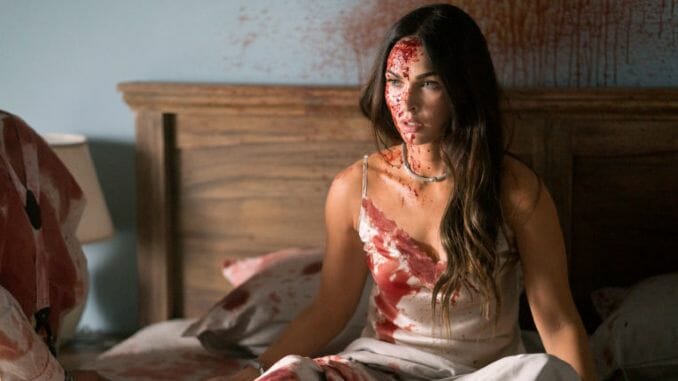Megan Fox’s Evolving, Pulpy Stardom Dominates Till Death and Midnight in the Switchgrass

What happens after a famously disparaged actress gets vindicated? Plenty of folks would now agree that the media narrative about Megan Fox circa 2009 was unfair, conceding a decade-plus later that Michael Bay was the bad guy in their Transformers dust-ups, Fox’s pinup-ready image was the product of Hollywood’s unrelenting male gaze and her attempt to prove herself outside of the fighting-robot franchise, Jennifer’s Body, is a damn good movie with a strong performance from its “controversial” star. But vindication can only go so far. The star market is still down, Fox never really became a major leading lady and her newest movies are opening mainly on VOD. At least the near-simultaneous release of those two titles affords an opportunity to explore her work as a star outside the harshest of spotlights. It may not be a coincidence that both movies involve her getting chained up by psychotic men.
Till Death, which came out earlier in July, initially doesn’t appear to play to Fox’s strengths. For about ten minutes, it’s a dour marital drama where Emma (Fox) extricates herself from an affair in an attempt to reconcile with her wealthy husband Mark (Eoin Macken). It quickly becomes clear that Mark is controlling and abusive, but he’s able to keep his worst tendencies just tamped-down enough to give Emma some hope—until she wakes up the morning after their seeming reconciliation handcuffed to her beau…who promptly shoots himself in the head. The burden of Emma’s terrible relationship becomes physicalized and literalized as she has to drag the bastard around with her as she evades the criminals Mark has hired to come after her.
This trim, compact movie is primarily a thriller, but it has horror-adjacent elements—practical gore; Mark’s Jigsaw-esque messages from beyond the grave; dark and gruesome flashes of humor—and that’s what ultimately makes it such a great match for Fox. From her popping red lipstick in the pre-mayhem sections to the blood splatter that perfectly soaks half of her face, Fox looks like a femme fatale captured mid-morph into scream queen. After years of objectification, she feels in control of her bombshell image. When Emma finally frees herself from the perceived obligation of making her marriage work, Fox’s performance turns scrappy and spiteful—and Till Death fairly crackles as its heroine must wriggle her way out of danger. 15 or 20 years ago, this would be a solid February programmer or August drive-in attraction, proving its star’s mettle.
-

-

-

-

-

-

-

-

-

-

-

-

-

-

-

-

-

-

-

-

-

-

-

-

-

-

-

-

-

-

-

-

-

-

-

-

-

-

-

-








































